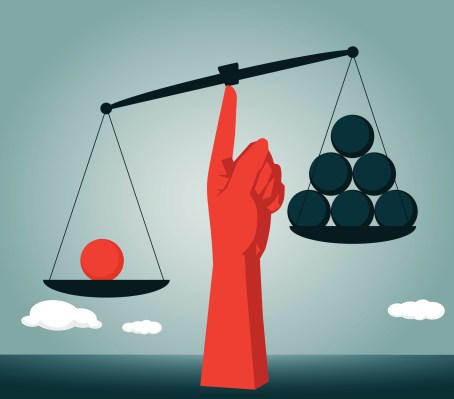As global poverty continues to decline, another issue emerges. According to the World Economic Forum, rising income inequality and the polarization of societies pose a risk to the global economy, and may lead to increased polarization and lack of political stability. This, however, is not a global problem. In developing countries, inequality is decreasing and the amount of people living in extreme poverty is at an all-time low. Mobile technology is contributing to financial inclusion in countries without an established financial infrastructure, and global markets create trade opportunities.
However, the increase in inequality is affecting high- and middle-income countries, as labor-saving technology has replaced many blue-collar jobs that paid well. Those workers have had to switch to retail and home healthcare jobs, where the pay is typically lower.
The disparity between the rich and everyone else is larger than ever in the United States, and few places is this skewed wealth distribution more visible than in and around Silicon Valley. The chasm between tech multi-billionaires and the rest of the population in Northern California — where an estimated 31 percent of jobs pay $16 per hour or less and the median income in the U.S. today is about the same as it was in 1995 — has led to the conclusion that the tech sector is greatly contributing to increased inequality.
According to The Second Machine Age, by Erik Brynjolfsson and Andrew McAfee, this has been a slow train coming since the 1980s, when the PC invaded offices and homes. This change has gathered momentum ever since, and the exponential nature of technology is now accelerating this development. While technological innovation has replaced jobs for decades, it has always created more jobs than it has destroyed.
The next wave of intelligent automation will strike hard at another portion of the middle class: Classic middle-income white-collar jobs, such as bank tellers, insurance underwriters, loan officers and case-file workers. Basically, every job that includes following the rules and making few decisions. In the banking sector alone, thousands of jobs are at risk of being decimated through the use of artificial intelligence to perform tasks that were previously considered too complex for automation. At last year’s World Economic Forum in Davos it was stated that artificial intelligence is ushering in the fourth industrial revolution, which will change society as we know it. According to a recent report from McKinsey, half of the world’s jobs could be automated by 2055.
The winner-takes-all dynamics of the digital economy is contributing to strongly monopolistic markets, where companies like Facebook, Google, Apple and Amazon are disintermediating incumbent industries.
Blaming technology is merely an excuse to abdicate responsibility.
Some may argue that platforms like Uber are generating new income opportunities, but a recent court ruling where Uber was fined $20 million for misleading drivers with inflated wage statistics tells a different story. Sharing has little to do with caring in the sharing economy, and has more in common with quasi-monopolies where freelancers must compete in a hyper-competitive environment by the grace of the platform — not so different from vassals in the feudal system.
Advancements in gene editing and biohacking, human augmentations and longevity is posed to enhance our lives, but may also lead to a new class divide, where an elite class emerges through both physical and mental upgrades.
While it is tempting to name technology as one of the main culprits for the rise in inequality, blaming technology is merely an excuse to abdicate responsibility. Technology does not cause income disparity, but enables increased efficiency and wealth creation. The problem is how we choose to distribute the wealth and benefits of increased efficiency. So far, we are not really doing a good job in this department.
As technology replaces human work, we should also give everyone a share of the benefits gained by increased productivity, the same way Finland is trialing universal basic income for all citizens. in order to equalize wealth distribution, both Bill Gates and Mark Zuckerberg have pledged to donate 99 percent of their fortunes to charity, and are encouraging others to do the same.
We have faced economic and social revolutions before, with the invention of the steam engine and mass production, and, just like the Luddites were sabotaging machinery in the Industrial Revolution, technology has always been considered a threat to social stability. Many may be claiming that this time is different, and they are completely right. Every time has been different, but we have still managed to transition successfully.
